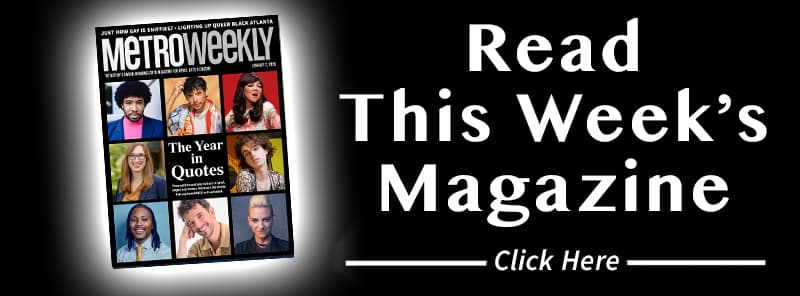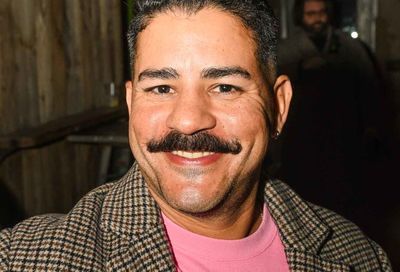Zero to Hero
Questions from the past play into our present -- and future -- in Theater J's Zero Hour and Woolly Mammoth's Eclipsed.
On Oct. 14, 1955, the actor and comedian Zero Mostel was called before the House Un-American Activities Committee (HUAC). He was asked if he was or had ever been a member of the Communist Party. He was asked, in a phrase that is as unsettling today as it was then, to ”name names.”

Zero Hour
(Photo by Stan Barouh)
Established in the late 1930s, HUAC’s mission was to investigate individuals and organizations with alleged ties to the Communist Party. The committee paid particular attention to entertainers, those individuals whose voices were heard loudly and widely. HUAC’s work would later be rightly seen as a modern-day witch hunt, destroying lives and careers in the name of some unfounded greater good.
Jim Brochu’s one-man show Zero Hour, the season opener at Theater J, takes that single transformative day in Mostel’s life and uses it to tease open a biography that is as fascinating as it is startlingly rich.
Heartfelt and humorous, Zero Hour exercises a pleasing restraint in its storytelling by using the simplest of frames. Mostel is in his painting studio, giving an interview to a New York Times reporter. The set-up allows Brochu to take full advantage of both Mostel’s complex personal history and wildly entertaining, quirky public persona. He jokes, reminisces and reveals in a fashion that is natural and uncontrived.
Brochu is an exceptionally talented writer and this play thrives because of his equal skills as an actor. He also manages the difficult act of investing in the life of an iconic figure without needlessly romanticizing him. (Though Brochu does step into the trap of indulging rather than editing in terms of the play’s length.)
Even as we revisit that day in front of the committee, we see a man who was not trying to be a hero or make some grand political statement. Mostel was a citizen frustrated by the ridiculousness of HUAC and angered by its indignity and waste. Brochu gives us the truth of the moment and the man, and allows those echoes to resonate satisfyingly in our own time.
Another D.C. season opener — this one at Woolly Mammoth — deals not with HUAC’s imagined civil war against Communism, but with the horrible atrocity that engulfed the country of Liberia in the late 20th century. True, Liberia’s internal struggles stretch back nearly to its founding, but it is the time just before the 2003 resignation of Charles Taylor that playwright Danai Gurira has chosen as the setting for Eclipsed, a haunting story about five women forced by circumstances into a single, volatile family unit.
Helena (Uzo Aduba) is the No. 1 wife of a Liberian rebel officer. Emotionally strong but resigned to her fate, Helena devotes much of her attention to providing whatever kind of comfort or safety she can to others in the compound.
There are some she has saved – like the No. 3 wife (Liz Femi Wilson) – and others she has lost. Her decision to hide a young girl (Ayesha Ngaujah) and the unexpected return of wife No. 2 (Jessica Frances Dukes) upsets the delicate illusion of balance Helena believes she has built.
Gurira’s play is brought beautifully and graphically into being by a cast of five tremendous actors. Particularly outstanding in her role is Ngaujah, whose onstage journey is the most radical. Ngaujah keeps the core of her character completely intact and available – allowing her audience to see both who she is and worry about who it is she might become.
Femi Wilson brings accomplishment to the unexpected humor of the show, holding her balance and resisting the temptation to draw too much spotlight to herself.
Finally, mention must be made of Aduba’s performance. Helena was clearly created by Gurira to be both the play’s compass center and the audience’s guide. Aduba brings wife No. 1 to life exuding hard-won dignity and steadfast pride.
The central question of Gurira’s play is about the nature of power, the seductive lure of the fast authority of violence set against the less obvious strength to be found in knowledge. The battle is heightened in the arena of war, where the stakes are all the more obvious but, as with Theater J’s Zero Hour, the questions raised are as important in our own time and in our own city.
If only the answers being sought in Woolly Mammoth’s production of Eclipsed shone as clearly and brightly as this moving production.
Support Metro Weekly’s Journalism
These are challenging times for news organizations. And yet it’s crucial we stay active and provide vital resources and information to both our local readers and the world. So won’t you please take a moment and consider supporting Metro Weekly with a membership? For as little as $5 a month, you can help ensure Metro Weekly magazine and MetroWeekly.com remain free, viable resources as we provide the best, most diverse, culturally-resonant LGBTQ coverage in both the D.C. region and around the world. Memberships come with exclusive perks and discounts, your own personal digital delivery of each week’s magazine (and an archive), access to our Member's Lounge when it launches this fall, and exclusive members-only items like Metro Weekly Membership Mugs and Tote Bags! Check out all our membership levels here and please join us today!
























